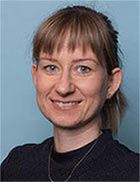SPS BISP TC Webinar: 6 December 2022, presented by Dr. Borbála Hunyadi

Upcoming SPS-BISP Webinar
Title: Tensor Decompositions in Functional Neuroimaging
Date: 6 December 2022
Time: 3:00 PM (CET)
Duration: Approximately 1 Hour
Presenters: Dr. Borbála Hunyadi, (TU Delft)
Register for the Webinar
Abstract:
Biography:

Dr. Borbála (Bori) Hunyadi was born in Budapest, Hungary. She received the M.Sc. degree in electrical and computer engineering from the Pazmany Peter Catholic University in 2009. In the same year, she joined Stadius, Department of Electrical Engineering at KU Leuven, where she worked in close collaboration with the Laboratory for Epilepsy Research, and received the Ph.D. degree in 2014.
She continued working in Stadius as a postdoctoral researcher on the ERC advanced grant Biotensors, and she served as the research lead on the Imec-ICON project SeizeIT. Between February and May 2016, she was a visiting researcher at the University of Oxford. In 2018, she was awarded one of the “Delft Technology Fellowships” for outstanding female academic researchers. In October 2018, she joined the Circuits and Systems group at TU Delft as an assistant professor. Her research interests include biomedical signal processing and machine learning for biomedical pattern recognition. More specifically, she is interested in multimodal signal processing and fusion, blind source separation, tensor decompositions, and wearable signal processing to better understand healthy and pathological physiology. In particular, she is leading projects on ECG, EEG and (functional) ultrasound signal processing for a variety of applications including atrial fibrillation, epilepsy, neuroscience research and cancer detection.
Dr. Hunyadi is the secretary of the IEEE EMBC Benelux chapter and vice-chair of the EURASIP technical area committee on biomedical signal and image processing.

